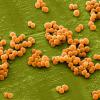Last year a small study by Abreu et al raised the exciting possibility that the sinus microbiome (the microbial community in our sinuses) being seriously out of whack could be behind chronic sinusitis. Which some day could result in sinusitis treatment being the restoration of beneficial microorganisms that should be there, perhaps with a nasal spray. From Science Daily, September 12, 2012:
Sinusitis Linked to Microbial Diversity
A common bacteria ever-present on the human skin and previously considered harmless, may, in fact, be the culprit behind chronic sinusitis, a painful, recurring swelling of the sinuses that strikes more than one in ten Americans each year, according to a study by scientists at the University of California, San Francisco.
The team reports this week in the journal Science Translational Medicine that sinusitis may be linked to the loss of normal microbial diversity within the sinuses following an infection and the subsequent colonization of the sinuses by the culprit bacterium, which is called Corynebacterium tuberculostearicum.
In their study, the researchers compared the microbial communities in samples from the sinuses of 10 patients with sinusitis and from 10 healthy people, and showed that the sinusitis patients lacked a slew of bacteria that were present in the healthy individuals. The patients also had large increases in the amount of Corynebacterium tuberculostearicum in their sinuses, which are located in the forehead, cheeks and eyes.
The team also identified a common bacterium found within the sinuses of healthy people called Lactobacillus sakei that seems to help the body naturally ward off sinusitis. In laboratory experiments, inoculating mice with this one bacterium defended them against the condition.
"Presumably these are sinus-protective species," said Susan Lynch, PhD, an associate professor of medicine and director of the Colitis and Crohn's Disease Microbiome Research Core at UCSF. What it all suggests, she added, is that the sinuses are home to a diverse "microbiome" that includes protective bacteria. These "microbial shields" are lost during chronic sinusitis, she said, and restoring the natural microbial ecology may be a way of mitigating this common condition.
Though the sinuses' underlying purpose is still unclear, they are all too familiar to American doctors and their patients because of what happens when the thin tissues lining them become inflamed, as occurs in chronic sinusitis -- one of the most common reasons why people go to the doctor in the United States. There are about 30 million cases each year, and the cost to the healthcare system is an estimated $2.4 billion dollars annually.
The pain of sinusitis can last for months. Doctors typically prescribe bacteria-killing antibiotics and, in more severe and long-lasting cases, conduct sinus surgeries. However, said Andrew Goldberg, MSCE, MD, the director of rhinology and sinus surgery at UCSF and a co-author on the paper, "the premise for our understanding of chronic sinusitis and therapeutic treatment appears to be wrong, and a different therapeutic strategy seems appropriate."
















































